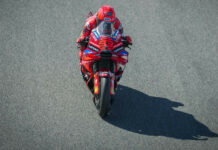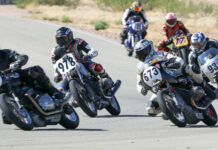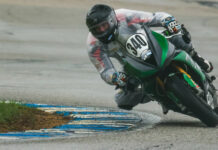FIRST PERSON/OPINION
By Michael Gougis
The FIM rule for jumped starts reads the same as the AMA Superbike series rule:
“Anticipation of the start is defined by the motorcycle moving forward while the red lights are on,” both rulebooks read.
But on the World Stage, jumped starts seem to have caused less controversy and debate than in the American National series. The difference, according to world officials, is in how the rule is interpreted and who is enforcing the rule.
Simply put, on the world stage, a standardized, trained set of officials are expected to use “common sense” in making sure a race start is fair. In the DMG-operated AMA Superbike Series, the rule has evolved into a way for operational officials (including grid marshals and timing & scoring workers) to get away with implementing draconian penalties for real or imagined offenses on the part of riders or other series participants, offenses that may or may not have anything to do with the start itself.
In each case, the rulebook FIM and AMA states that a rider who is caught moving forward before the lights go out is penalized with a ride-through penalty, forced to enter and ride down the length of the pit lane at a reduced speed (50 mph for AMA events) enforced by radar as the rest of the field streaks down the front straight at race speed. It’s a serious penalty.
And FIM officials take movement in the grid box seriously. Their idea of “significant” movement can be a mere inch, even if the motorcycle’s front wheel does not leave the starting line box, says Dennis Noyes, who has worked in Race Control for Dorna and in the Spanish National series.
“Any significant ‘rolling,’ even if the bike does not cross the white line, is always penalized,” Noyes says. “Significant movement say an inch may give no advantage, but it does provoke other riders to jump. The FIM procedures work very well, especially because they are as strict about mid-pack and back-row jumps.”
And just because a rider does not gain an advantage from movement in the box does not mean he or she will escape penalty. The idea is to make sure that riders don’t start “creeping up” on the line of what is acceptable and what is not at the start of a race. If one rider gets away with it, it encourages other riders to push the rules as well.
“If there is significant movement while the light is on, even if there is no advantage, a ride-through results,” says Paul Butler, permanent Race Director for FIM-sanctioned MotoGP.
However, in an important difference from the way the rule is enforced in the AMA Superbike series, Butler says that not all movement is significant, and enforcement involves a judgment call on the part of officials.
“If it’s no more than a twitch through engaging gear, common sense prevails and no penalty is incurred,” Butler says.
And that system works, Butler says, because at the world level, the officials are consistent from race to race, circuit to circuit, and so the same people are making the same calls, week after week. What gets you penalized in June gets you penalized in September; what is OK in May is OK the rest of the year.
“The same team makes the call at each race, so the procedure and judgment is consistent,” Butler says.
That is not the way Daytona Motorsports Group (DMG, currently doing business as AMA Pro Racing) officiating of the 2009 AMA Superbike Series has worked out.
Multiple reliable sources within the DMG event staff have confirmed to Roadracingworld.com that certain riders have been singled out for extra, punitive scrutiny in tech, on the grid, and on the track that other riders do not face. Those sources””which included DMG officials and workers at multiple levels inside the organization–spoke to Roadracingworld.com on the condition that their identities not be revealed, fearing retribution.
Certain DMG race officials have interpreted the rules in the strictest possible manner when it comes to targeted riders while ignoring the same “transgressions” of other riders during the 2009 racing season. The most minute movements on the starting grid, movements that other riders might make without raising an eyebrow, have drawn an intense reaction from officials gunning for riders they have targeted, the sources confirmed.
Asked why certain riders were penalized for minute grid movement that did not result in any competitive advantage, DMG Director of Road Racing Bill Syfan’s first line of defense during the series finale weekend in New Jersey was to point out that DMG uses the same grid rules as the FIM. Syfan then said, “We’re trying to eliminate judgment calls,” followed by “Look, we’re just following orders” issued by DMG managing partner and AMA Pro Racing President Roger Edmondson.
“Trying to eliminate judgment calls” is an argument that various AMA (and now DMG) officials have trotted out before, and critics say it’s because those officials don’t want to have to defend their actions. Two years ago, (then) AMA Pro Racing Road Racing Manager Morgan Broadhead told Roadracingworld.com in an interview after the race at Auto Club Speedway in Fontana:
“We were trying to make it black-and-white; cut the course, get a penalty, and we would not have to try to determine whether the course cut had resulted in an advantage,” Broadhead had said. “We wanted to make sure it would not be a judgment call as to whether a rider had gained an advantage.” Broadhead made that statement in defense of a ride-through penalty applied to a rider who got into a corner too hot and elected to stand his bike up and run off the course when the front wheel started hopping, to avoid a potential crash. The rider lost time and several positions, and rejoined the track safely, but was then called in for a ride-through.
But using the old “eliminate judgment calls” argument has led to a new form of abuse of power by current DMG officials, an abuse that DMG insiders admit has been going on all season. While DMG officials like Syfan are quick to point out that they use the same rule as the World Superbike and MotoGP series, the DMG approach foregoes the application of common sense and has become a tool of retribution.
It is difficult to imagine an entire field of riders on 185-horsepower American Superbikes, balanced right on the engagement point of the clutch, managing to stage and launch without so much as compressing a fork spring. In reality, it’s no longer a question of whether someone moves; under those circumstances, motorcycles are going to twitch and move. It’s a question of who gets penalized for it. In other cases, it’s not about how a lapped rider behaves; it becomes about who the lapped rider is. If the lapped rider is Johnny Rock Page, almost universally despised by DMG officials, one standard applies. If the lapped rider is somebody DMG officials like, another standard applies.
And removing “common sense” from an official’s toolbox allows a grid marshal with a grudge or axe to grind for whatever reason to hide behind the “no judgment call” philosophy while aiming punitive levels of scrutiny in the pits and on the track at riders who have angered members of the DMG staff for a litany of real or imagined slights. One official admitted that riders have been targeted for criticizing timing and scoring when the system didn’t work at the start of official practice, for offending registration workers and for questioning (or exposing) the actions or motives of DMG officials.
Some highly placed DMG officials, our sources said, react badly to any criticism from series participants and instead of trying to correct problems, add the names of people who complain to an officiating “hit list.”
“Roger Edmondson will promise anything and say whatever he thinks will smooth over a rider or a team owner or a sponsor at the time, and then doesn’t follow up,” said one long-time series participant. “He doesn’t do anything to solve the problem. Then his underlings come after people with punitive rules enforcement and make things worse. If it isn’t the tech guys looking at your bike harder than they look at anybody else’s or tearing it apart more often, it’s officials going frame-by-frame through grid camera footage to try to find something nobody could see just using their eyes.
“We used to think DMG taking over the series would eliminate problems with officiating by ‘old AMA Pro’ officials,” the participant added. “What we’ve figured out now is that we didn’t know how good we used to have it.”






